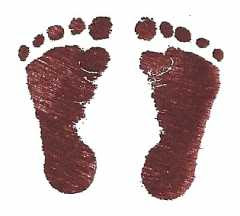
How does food make you feel?
What role does it play in your daily life?
Do you live to eat or do you eat to live?
For some of us food is a pleasure and for others it is a fear. Our attitude towards it begins at a very early age and it generally begins with an absolute aversion to vegetables! Ask most children what they least like about food and they will tell you without hesitating "broccoli" "carrots" "anything green" or anything "healthy"! But why is that? Maybe for some children the the taste and texture of plain boiled vegetables is un-palatable, and maybe some parents fear giving them anything with too much flavour at an early age in case it upsets their stomachs. Well, go tell that to someone from a third world country, where food is scarce and often highly spiced to mask the taste of rotting meat. There are not many fussy eaters in that part of the world! Children often adopt their parents eating habits, good or bad and will be reluctant to try anything that their parent dislikes too.
So whether your anxieties with food stem from your childhood or from some other time during your growing up years, the fact remains that these habits stay with you for a very long time. When a client comes to me wanting to lose weight, the first thing we tackle is their eating habits. There is no point putting anyone on an exercise regime if their eating habits are off whack! You can run as many miles as you want and lift as much weight as you like, but if you are binge eating or not eating enough or eating foods that disagree with you, then you might as well not bother. To really lead a life of health and wellness, the issue of food must be dealt with as a priority and balance must be restored.
For many people the problem with food is a very complex one. Eating disorders are increasingly common amongst all age groups and people often try to battle through it alone, fearing that they will be judged or considered weak and stupid if they tell anyone their dirty secret. It is not just about being anorexic or bulimic. Even though may be the two most common disorders and will usually require some sort of advanced psychological therapy to be treated, there are many other disorders within our society. Many of these other disorders are considered "normal" and acceptable but they are as equally damaging to peoples lives. There will be those who refuse to eat carbs of any kind and others who claim to have intolerances to just about everything and many more who restrict their diets because of the fear of gaining pounds. Eating disorders come in many different disguises and are often more common amongst those who also have addictive tendencies. We can be addicted to just about anything, be it good or bad. Too much of a good thing can also be damaging and it is why we need to find the balance. We need to eat, otherwise we die, so it is not something that we can turn our backs on and ignore. The first step we need to take towards achieving balance and moderation in our food consumption is to be aware. Once you become aware and accept that there is a problem, the journey to wellness can begin.
Taking some time to investigate not just what we eat but how and why we eat makes moderation more achievable. Keeping a food diary is a great help at this stage. Writing down everything that you put into your mouth on a daily basis throughout the week and including your emotions in the equation can be very eye opening. You may find that there is a link between the chocolate cake craving that you had on Monday, with a particularly stressful experience that you were going through or about to go through that same day. It is often apparent that we go searching for those high carb, high fat comfort foods during moments of anxiety, loneliness and sorrow or when we have an emotional void that needs to be filled. Our emotions are dictating the foods that we are eating and as a result our bodies are suffering the consequences. It is obvious why we eat. We have to eat in order to survive. But what and how we eat is really a very different and complex matter. The relationship between our minds and our stomachs is a volatile one and our bodies are the victims. For us to achieve a healthy balance in life, all aspects of our lifestyle must be in harmony. Eating in Moderation, exercising in moderation, moderating the hours we spend at work and with our families and sleeping the right amount of hours are all part of the big picture. Tip one of those things over the edge and the rest will follow. Moderation is a habit which can be cultivated through knowing that you will be happy giving yourself what you need and not letting the object of your desire become your master. Whenever something becomes an addiction, it is almost certainly time to let it go. If you can learn to love something and use it in a moderate way, be it food or exercise or anything else in your life, then you will never have to give it up. You will learn to use it moderately and be able to enjoy it every now and then rather than allow it to take control and fill you with guilt.
It is apparent to me that women suffer far more from negative relationships with food. We are always trying to "cut down", "eliminate", "detox" or "fast" our way to better health. But in doing so we are simply feeding our insecurites and fuelling our negative attitudes. If your thoughts are focused on trying not to eat food, then your mind will simply focus on food as a temptation and guilty pleasure. If you try to banish food from your mind you will simply crave it even more! Try instead to focus on the benefits of food. Good, nutritious food. Think of the reaction you get from your children when you tell them not to do something...they want to do it more than before. Your mind will do the same. The good angel in your head will tell you that you must not do this or that and the devil in your mind will make it loud and clear that you will most certainly do the opposite! How exhausting to have this continual battle going on in your mind day in, day out! The key to overcoming the negative is to focus on the positive. Think about all the wonderful foods that exist which are nutritious and beneficial to our wellbeing. Think how lucky you are to have that choice and to have that control. Understand that by feeding your mind with good and positive guilt free thoughts, you will be feeding your body with goodness and positive energy through the food that you eat. Once you have achieved a balance in your eating, the excess weight will start to drop off and you will begin to see positive changes in your attitude towards food and eating.
Try using the following tools to help you stay on the right path:
1. Stop and question why you want to eat and if the answer is anything other than hunger, then go and find something else to do.
2. If your need for food stems from a deeper emotional place, then take time out to address that emotion and find a replacement for the food. Try going on a walk, calling a friend, meditating, reading, anything other than eating.
3. If your need for food is a genuine feeling of hunger, then go and prepare yourself something nutritious and satisfying with a good balance of protein and carbohydrate. You will feel guiltless by feeding yourself this way and your mind/body will not feel deprived of what it needs.
Most people find that after a few weeks or months of feeding themselves with healthy nutritious foods, a lot of their cravings for bad, toxic foods will disappear. It can, however, be a long and difficult journey for a lot of people, but a journey that I know will be worth the sweat and tears once you get to a place of balance and moderation.
Eat Clean, Train Smart and Sleep well.....the rest will sort itself out!
In health and happiness,
Tamara








aaahhh this resonates SO MUCH with me! Food is definitely a crutch for me, and I am trying to break out of this weird relationship I have with it.
ReplyDeleteI found that the Paul McKenna "I can make you thin" book and cd was invaluable in trying to unravel some of my emotional conditioned responses to food, and I would greatly recommend it to anyone who has that sort of issue. the key message- food will always be there, you don't have to binge!- was exactly what I needed to hear rather than the usual "don't eat, limit, cut down, avoid" etc etc.
As the mother of two young girls I am also acutely aware of trying to avoid passing down negative attitudes when it comes to food. But it's tricky. I try not to be too strict about things like finishing up what's on their plate (surely it's a good thing if they learn to stop when they're full?) but I find myself in a minority and wonder whether perhaps this is wrong!
That's right MG, food will always be there.If you can plan your meals throughout the day, you will always know that there is no need to over-eat because another nutritious snack/meal is waiting for you in a couple of hours. If you find that your girls are never able to finish what is on their plate, then try giving them smaller portions. That way you do not have the temptation of finishing off their plates and they don't have to deal with the guilt associated with not eating everything. Children very rarely overeat at a young age and neither to they allow themselves to starve. They listen to their natural hunger signs, something that we lose touch with as we age.Forcing a child to eat more when they are already full, in my opinion, is a good way to turn food and eating into a negative experience. As a mother of 3, I have found this to be quite effective, as neither of them have issues with their food. Thank you for your comment and recommendation! I will check out that book. Tamara
ReplyDeleteHi, my problem is that I cut out food when I am emotionally stressed and unhappy. And therefore suffer from lack of essential nutrients and vitamins!
ReplyDeleteI am however 'lucky' in that I have an intolerance to MSG which means I have to be alert to everything I put in my mouth. I was devastated to be told the other day that parmesan cheese contained MSG. But I continue to read labels of all sorts. As for the chocolate cake, I can't eat chocolate as am allergic to it, or rather my liver refuses to digest it and I come out in sweats just under my eyes. Delightful for someone living in Switzerland.
Stay healthy and thanks for your good work Tamara! Tracey